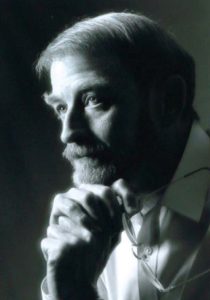Orbit of Meter Book Launch
A book launch reception for The Orbit of Meter: Writings on Poems and Prosody by Robert Wallace will be held Monday, April 17, 2023, from 3:00 to 5:00 on the third level of Duane G. Meyer Library on the main Springfield campus of Missouri State University. The book was edited by James S. Baumlin and Anne Marie Baker, foreword by Christine Wallace, and is the latest publication of the Ozarks Studies Institute, an ongoing initiative of the Missouri State University Libraries that seeks to preserve the heritage of the Ozarks, its culture, environment, and history.

The Missouri State University Libraries, in conjunction with the MSU Department of English, will kick off English Week with this free and open-to-the-public book launch reception and a panel discussion on the book in the Ozarks Room (Duane G. Meyer Library, Room 302). A reception and guided archival tour of the Robert Wallace Collection will follow in MSU Libraries’ Special Collections and Archives (Duane G. Meyer Library, Room 306).
The panel will feature remarks by Christine Wallace, who will speak of the author Robert Wallace and the genesis of the book. Jim Baumlin will talk about the book’s original contribution to poetic meter in English, and Tracie Gieselman France will discuss Wallace as a Springfieldian and the significance of the Wallace Collection, one of the premiere collections located in Special Collections and Archives of MSU Libraries.
The support of the Missouri State Foundation, the Ozarks Studies Institute, and the Department of English is greatly appreciated.
Robert Wallace (1932-1999) forged a distinguished career as a poet, teacher, editor, and prosodist. Printed here for the first time, the monograph Free Verse and the Orbit of Meter mounts a rigorous defense of an original—and still controversial—theory of prosody first outlined in his essay, “Meter in English.” The Ozarks native was a prolific letter writer, whose correspondents included John Updike, Dana Gioia, Donald Hall, Ted Hughes, Linda Pastan, and Mary Oliver. The volume ends with a descriptive inventory of his literary correspondence.